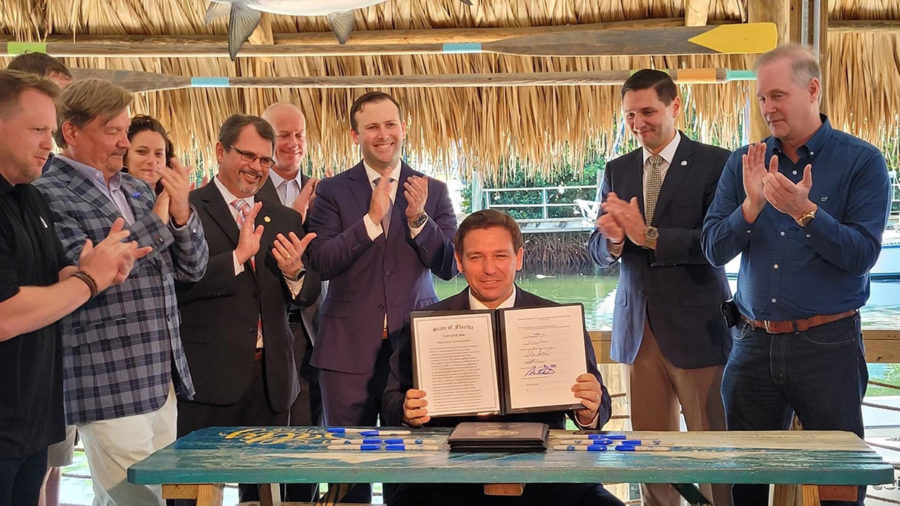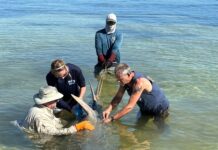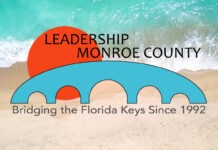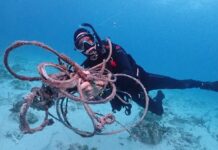Mask-wearing mandates and other local government COVID-19 restrictions on businesses and individuals in Florida are no longer in effect, per a pair of executive orders signed by Gov. Ron DeSantis on May 3.
And on the morning of May 5, Monroe County followed suit. A special meeting of the Monroe County Board of County Commissioners saw unanimous approval of a repeal to a local ordinance that requires everyone to wear a mask upon entry into a restaurant or business. It was set for a June 1 sunset, but DeSantis’ orders immediately ended that local restriction.
Business owners can still require masks when patrons enter their establishments, but DeSantis’ orders override any approved decision-making and oversight by city and county governments over COVID measures that infringe on rights or liberties.
The first executive order signed by DeSantis suspends all local COVID-19 restrictions and mandates on individuals and businesses through the end of June. Come July 1, a second executive order goes into effect officially invalidating emergency orders by local municipalities in relation to COVID-19 emergencies that restrict the rights or liberties of people and businesses.
Executive orders that end local mask rules don’t apply to schools, per the Florida Department of Education. Orders only pertain to city and county government restrictions on individuals and businesses. The Monroe County School District will continue to require masks for students and staff.
DeSantis signed the executive order following a May 3 press conference in St. Petersburg, where he also signed legislation that disallows states and local governments from closing businesses or preventing students from receiving in-person instruction at school. The bill passed through the House and Senate before the end of session last week.
Executive orders and legislation signed into law only apply to pandemics and other public health emergencies. It exempts orders in response to a hurricane or other weather-related emergency.
Per the bill DeSantis signed, any ordinance or measure depriving a person of a right, liberty or property requires a governmental entity to prove that the measure is “narrowly tailored” and serves a “compelling governmental interest” through the “least intrusive means.” It also authorizes the governor or legislature to invalidate a city or county measure that “unnecessarily restricts a constitutional right, fundamental liberty or statutory right.”
Citing the vaccines’ success and effectiveness, DeSantis said his orders that end local mandates are the “evidence-based things to do.” Just over 9 million Floridians received either the one-dose Johnson & Johnson or the two-dose Moderna or Pfizer series, as of May 5. More than 5 million of those are over 55 years of age.
Local actions that restrict in-school instruction or close business must satisfy demanded and continuous justifications, DeSantis said.
“I think folks that are saying that they need to be policing people at this point, you really are saying you don’t believe in the vaccines, you don’t believe in the data, you don’t believe in the science,” he said. “We’re no longer in a state of emergency.”
County Mayor Michelle Coldiron, who called the special meeting, said she wished to stay in lock-step with DeSantis’ executive orders.
“It’s up to each individual to wear their mask or not,” she said. “Any private owned business can still require that you don a mask when you enter their premise.”
Commissioner David Rice said that while he believes there’s an obligation to follow the governor’s orders, the risk of community spread hasn’t terminated just yet. He went on to say that people should pay close to attention to friends and family whose immune systems are suppressed.
“I, for one, would not go around one of them without a mask, out of concerns of their fragile health,” he said.
Commissioner Mike Forster said he’s not in agreement with everything that’s taken place during the legislative session in Tallahassee.
“I think in most cases, we’re best to determine what’s best for the community,” he said. “We can fight it but it’s a fight we’ll lose,” Forster said regarding DeSantis’ orders.

Monroe County’s mask ordinance repeal also applies to the City of Marathon and Village of Islamorada, as neither wrote their own ordinance. (The City of Key West did.) That means masks will no longer be required in either city hall or the county buildings.
County Administrator Roman Gastesi said during the special meeting that the move by DeSantis was premature. He said employees can still wear masks.
“You can all go through life how you want to go through your life,” he said. “No one’s going to say you can’t wear a mask.
“We still have to be careful, be smart and be safe out there.”
Key West city attorney Shawn Smith told city commissioners at their meeting on the evening of May 4 that they need to let their mask mandate expire. “Once again, Tallahassee has preempted you from acting,” Smith said.
Courthouses, however, are under a different jurisdiction. Rules regulating them are written in the state capital, Tallahassee.
New cases of COVID-19 in Monroe County are averaging just over 10 a day. Those in the Keys receiving vaccines are approaching 38,000.
In total, cases of COVID-19 in the Keys since the pandemic began total 6,946. Of that number, just over 6,500 are residents and around 400 nonresidents.
Key West has led in total cases with just over 3,200 since the pandemic began. Cases in Key Largo since the start are just over 1,000, while Marathon has seen just over 780 cases since the beginning.
DeSantis’ executive orders addressing local COVID-19 restrictions go back to September 2020, when he suspended collection of local fines and penalties associated with COVID-19 regulations on individuals. In March, another executive order by DeSantis’ canceled all fines on individuals and businesses related to city and county COVID-19 restrictions.
In late March, DeSantis signed into law Senate Bill 72, which provides liability protection to individuals, businesses, educational institutions, churches and health care providers for liability claims related to COVID-19. And just a month later, he extended a state of emergency to ensure students remained in school for the rest of the year, while also quashing any vaccine passport requirements “as a condition of participating in everyday life.”
“We worked very hard particularly since summer to jettison policies, and we focused on lifting people up, getting people back to work and we wanted to get kids back to school,” DeSantis said during the press conference. “We thought that it was important that parents have the ability to send their kids to school, and we wanted our economy to be healthy and society to be healthy. We wanted people to be happy living in Florida.”
























